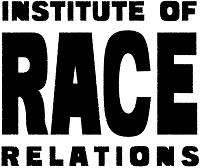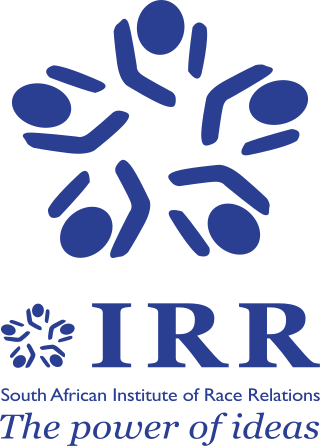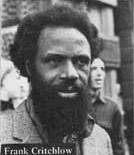Related Research Articles

Michael X, born Michael de Freitas, was a Trinidad and Tobago-born self-styled black revolutionary and civil rights activist in 1960s London. He was also known as Michael Abdul Malik and Abdul Malik. Convicted of murder in 1972, Michael X was executed by hanging in 1975 in Port of Spain's Royal Gaol.

Leighton Rhett Radford "Darcus" Howe was a British broadcaster, writer and racial justice campaigner. Originally from Trinidad, Howe arrived in England as a teenager in 1961, intending to study law and settling in London. There he joined the British Black Panthers, a group named in sympathy with the US Black Panther Party.
John La Rose was a political and cultural activist, poet, writer, publisher, founder in 1966 of New Beacon Books, the first specialist Caribbean publishing company in Britain, and subsequently Chairman of the George Padmore Institute. He was originally from Trinidad and Tobago but was involved in the struggle for political independence and cultural and social change in the Caribbean in the 1940s and 1950s and later in Britain, the rest of Europe and the Third World.
Ambalavaner Sivanandan, commonly referred to as A. Sivanandan or "Siva", was a Sri Lankan Tamil and British novelist, activist and writer, emeritus director of the Institute of Race Relations (IRR), a London-based independent educational charity. His first novel, When Memory Dies, won the 1998 Commonwealth Writers' Prize in the Best First Book category for Europe and South Asia. He left Sri Lanka after the 1958 riots.
Dame Jocelyn Anita Barrow was a British educator, community activist and politician, who was the Director for UK Development at Focus Consultancy Ltd. She was the first black woman to be a governor of the British Broadcasting Corporation (BBC) and was founder and Deputy Chair of the Broadcasting Standards Council.
Sir Horace Shango Ové was a Trinidadian-born British filmmaker, photographer, painter and writer based in London, England. One of the leading black independent filmmakers to emerge in Britain in the post-war period, Ové was the first black British filmmaker to direct a feature-length film, Pressure (1976). In its retrospective documentary 100 Years of Cinema, the British Film Institute (BFI) declared: "Horace Ové is undoubtedly a pioneer in Black British history and his work provides a perspective on the Black experience in Britain."

Claudia Vera Jones was a Trinidad and Tobago-born journalist and activist. As a child, she migrated with her family to the United States, where she became a Communist political activist, feminist and Black nationalist, adopting the name Jones as "self-protective disinformation". Due to the political persecution of Communists in the US, she was deported in 1955 and subsequently lived in the United Kingdom. Upon arriving in the UK, she immediately joined the Communist Party of Great Britain and would remain a member for the rest of her life. She then founded Britain's first major Black newspaper, the West Indian Gazette, in 1958, and played a central role in founding the Notting Hill Carnival, the second-largest annual carnival in the world.

The Institute of Race Relations (IRR) is a think tank based in the United Kingdom. It was formed in 1958 in order to publish research on race relations worldwide, and in 1972 was transformed into an "anti-racist think tank".

The South African Institute of Race Relations (IRR) is a research and policy organisation in South Africa. The IRR was founded in 1929 to improve and report upon race relations in South Africa between the politically dominant white group and the black, coloured, and Indian populations, making the Institute "one of the oldest liberal institutions in the country".

Frank Gilbert Crichlow was a British community activist and civil rights campaigner, who became known in 1960s London as a godfather of black power activism. He was a central figure in the Notting Hill Carnival. His restaurant, The Mangrove in All Saints Road, served for many years as the base from which activists, musicians, and artists organised the event.
Alex Pascall, OBE, is a British broadcaster, journalist, musician, composer, oral historian and educator. Based in Britain for more than 50 years, he was one of the developers of the Notting Hill Carnival, is a political campaigner and was part of the team behind the birth of Britain's first national black newspaper The Voice. Credited with having "established a black presence in the British media", Pascall is most notable as having been one of the first regular Black radio voices in the UK, presenting the programme Black Londoners on BBC Radio London for 14 years from 1974. Initially planned as a test series of six programmes, Black Londoners became, in 1978, the first black daily radio show in British history.
Pearl Connor-Mogotsi, née Nunez, was a Trinidadian-born theatrical and literary agent, actress and cultural activist, who was a pioneering campaigner for the recognition and promotion of African Caribbean arts. In the UK, in the 1950s, she was the first agent to represent black and other minority ethnic actors, writers and film-makers, and during the early 1960s was instrumental in setting up one of Britain's first black theatre companies, the Negro Theatre Workshop. In the words of John La Rose, who delivered a eulogy at her funeral on 26 February 2005: "Pearl Connor-Mogotsi was pivotal in the effort to remake the landscape for innovation and for the inclusion of African, Caribbean and Asian artists in shaping a new vision of consciousness for art and society."
Ansel Keith David Wong is a Trinidadian-British cultural and political activist, who has been influential in many organisations particularly in the black community in the United Kingdom, where he has been based since the 1960s. He is the former Chair of the Notting Hill Carnival Board and founder of Elimu Mas Band. He is also an educationist and academic, and in a wide-ranging career has worked at senior levels in various organisations in the public and charitable sectors, including with the Windrush Foundation established in 1996 by Arthur Torrington.

Altheia Jones-LeCointe is a Trinidadian physician and research scientist also known for her role as a leader of the British Black Panther Movement of the 1960s and 1970s. Jones-LeCointe came to public attention in 1970 as one of the nine protestors, known as the Mangrove Nine, arrested and tried on charges that included conspiracy to incite a riot, following a protest against repeated police raids of The Mangrove restaurant in Notting Hill, London. They were all acquitted of the most serious charges and the trial became the first judicial acknowledgement of behaviour motivated by racial hatred, rather than legitimate crime control, within the Metropolitan Police.
Blacks Britannica was a 1978 American documentary film directed and produced by David Koff and Musindo Mwinyipembe. An analysis of the Black British experience of racism in Britain, it featured contributions by Colin Prescod, Darcus Howe, Jessica Huntley, Gus John, Claudia Jones, Courtney Hay, the Manchester community worker Ron Phillips, Tony Sealy and Steel Pulse.
Leila Hassan Howe is a British editor and activist, who was a founding member of the Race Today Collective in 1973, having previously worked for the Institute of Race Relations. She became editor of the Race Today journal in 1986. Hassan was also a member of the Black Unity and Freedom Party. She is co-editor of a collection of writings from Race Today published in 2019.
Pearl Priscilla Prescod was a Tobagonian actress and singer. She was one of the earliest Caribbean entertainers to appear on British television and was the first Black woman to appear with London's National Theatre Company.

Rhodan Gordon was a Black British community activist, who migrated to London from Grenada in the 1960s. He came to public attention in 1970 as one of the nine protestors, known as the Mangrove Nine, arrested and tried on charges that included conspiracy to incite a riot, following a protest against repeated police raids of The Mangrove restaurant in Notting Hill, London. They were all acquitted of the most serious charges and the trial became the first judicial acknowledgement of behaviour motivated by racial hatred, rather than legitimate crime control, within the Metropolitan Police.
Amon Saba Saakana, formerly known as Sebastian Clarke, is a Trinidad-born writer, journalist, lecturer, filmmaker and publisher, who migrated to Britain in 1965. In the 1970s, he founded the publishing imprint Karnak House in London. As an author, his books encompass poetry, fiction, literary criticism, and works on cultural and historical topics.
The Universal Coloured People's Association (UCPA) was a black power organisation in the United Kingdom from June 1967 to July 1970.
References
- 1 2 3 "Colin Prescod". Iniva . Retrieved 26 November 2020.
- 1 2 3 4 Maccoby Berglof, Annie (27 July 2012). "At home: Colin Prescod". Financial Times .
- 1 2 3 4 Zahir, Samina (2002). "Prescod, Colin". In Alison Donnell (ed.). Companion to Contemporary Black British Culture. Routledge. pp. 337–8. ISBN 978-1-134-70025-7.
- ↑ Prescod, Colin (6 June 2019). "The 'rebel' history of the Grove". Institute of Race Relations . Retrieved 26 November 2020.
- ↑ "The Black Liberator". Black Cultural Archives (Google). Retrieved 26 November 2020.[ dead link ]
- 1 2 Prescod, Colin (14 November 2013). "Groundings of the IRR". Institute of Race Relations. Retrieved 26 November 2020.
- ↑ "Management". Institute of Race Relations. Retrieved 26 November 2020.
- ↑ Lambert, Léopold (20 February 2020). "COLIN PRESCOD /// Justice4Grenfell: A Political Walk in North Kensington, London". The Funambulist (Podcast). No. 135. Retrieved 24 June 2022.